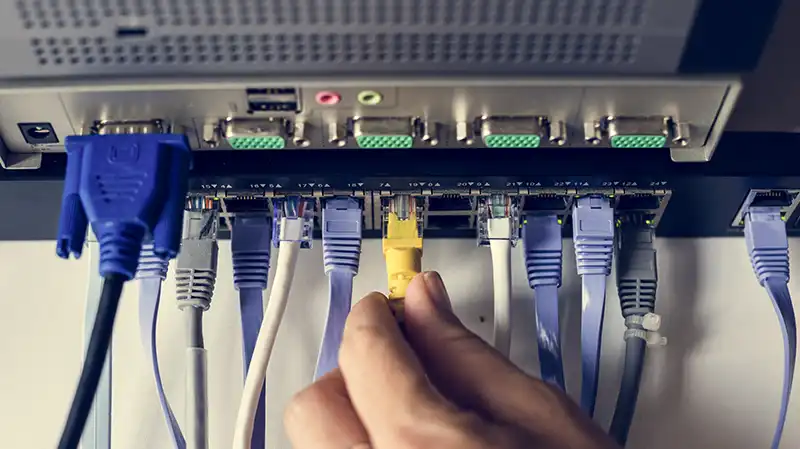
If you're upgrading your business's security or building one from scratch, you've likely encountered two acronyms: DVR (Digital Video Recorder) and NVR (Network Video Recorder). In this article, we'll break down the key differences between NVR vs DVR, lay out the pros and cons of each, and help you decide which setup fits your business best.
Both are used to store footage from security cameras, but they're built on very different technologies. Select the wrong system, and you may end up with grainy footage, limited coverage, or a system that struggles to keep up as your business expands.
DVR and NVR systems perform the same core function: recording and storing video from security cameras. However, under the hood, they operate in very different ways, particularly in terms of how footage is captured, processed, and accessed.
So, what's the practical difference between the two?
In short, DVRs are simpler and more traditional. NVRs are smarter, more flexible, and built for modern security needs.
DVR systems still have their place, especially for smaller businesses or those with simpler security needs. If you're not looking for fancy features and just want to "keep an eye on things," a DVR system is enough.
If your business already has analog cameras installed, sticking with a DVR can help you avoid a full rip-and-replace. It's a cost-effective way to modernize without having to start from scratch.
DVRs work well in spaces with fewer cameras and limited physical distance between them, such as a small office, a single storefront, or a compact warehouse. Since DVRs rely on direct cable runs, the simpler the layout, the better.
If cost is your biggest concern and you're okay with lower resolution and fewer features, a DVR might be all you need. That said, it's important to understand the tradeoffs in video quality and inflexibility.
Most growing businesses today are opting for NVR systems, which are built for flexibility, scalability, and future-proofing. Here's why more business owners are making the switch:
NVR systems pair with IP (internet protocol) cameras that deliver crisp HD and even 4K video. That means better detail for identifying faces, license plates, or specific incidents, which is critical when reviewing footage after an event.
NVRs use standard network cables (like Cat5e or Cat6), which carry both power and data through a single cable (Power over Ethernet, or PoE). That makes installation cleaner and easier to expand in larger buildings.
With an NVR system, you can view live and recorded footage from your phone or laptop and set up motion-triggered alerts or smart analytics. You can also integrate with other systems, like alarms or access control, and store footage in the cloud, locally, or both.
These features enable you to monitor operations from anywhere and respond more quickly if an issue arises.
While the upfront cost of NVR systems is typically higher, the long-term value makes up for it. You get better quality, more functionality, and fewer limitations as your needs evolve.
Not every business has the same needs, so choosing between NVR vs DVR should depend on your specific situation. Here are some key questions to help you make the right call:
Analog cameras pair with DVR systems. IP cameras require NVR systems.
If you're starting from scratch or looking to upgrade, IP cameras and NVRs offer greater flexibility and future-proofing capabilities.
Suppose your business relies on detailed footage (like reading license plates, facial recognition, or tracking customer flow in retail). In that case, NVR is the better choice thanks to higher video resolutions and digital zoom capabilities.
If real-time mobile access, push notifications, and smart analytics are important to you, NVR is the winner. While a DVR system offers limited remote access, it's usually clunkier and less secure.
For multi-building campuses, larger properties, or businesses that plan to grow, NVRs scale much better. Running one network cable per camera (instead of coax plus power) makes adding or repositioning cameras much easier.
If you're on a very tight budget and already have analog cameras in place, a DVR might be the quick fix. However, let's suppose your business relies on top-tier security, customer safety, or 24/7 visibility. In that case, an NVR setup will pay off in terms of performance and peace of mind.
Whether you're leaning toward a DVR for its affordability or planning a scalable NVR-based system with advanced features, choosing the right technology is only half the equation. The other half is partnering with a commercial AV integrator that knows how to design, install, and support a system tailored to your actual business needs.
At Carolina Georgia Sound, we've been helping businesses in retail, hospitality, healthcare, education, and property management protect their people and property since 1988. Our team will:
Let CGS help you cut through the confusion and select a system that grows with your business. Contact us today to schedule a site assessment and receive a customized NVR vs DVR recommendation tailored to your goals, layout, and budget.

Fill out this form to schedule a call or in-person meeting.